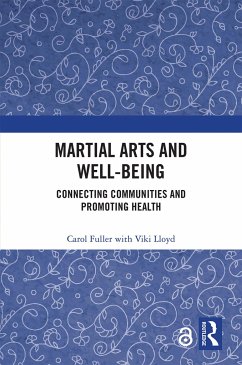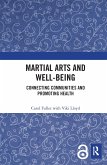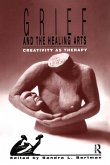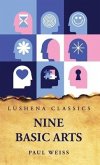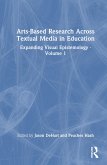- Gebundenes Buch
- Merkliste
- Auf die Merkliste
- Bewerten Bewerten
- Teilen
- Produkt teilen
- Produkterinnerung
- Produkterinnerung
Martial Arts and Well-Being explores how Martial Arts can contribute in important ways to health and well-being, as well as providing other broader social benefits.
Andere Kunden interessierten sich auch für
![Martial Arts and Well-being Martial Arts and Well-being]() Carol FullerMartial Arts and Well-being58,99 €
Carol FullerMartial Arts and Well-being58,99 €![Grief and the Healing Arts Grief and the Healing Arts]() Sandra BertmanGrief and the Healing Arts220,99 €
Sandra BertmanGrief and the Healing Arts220,99 €![A Complex Systems View on the Visual Arts A Complex Systems View on the Visual Arts]() Paul van GeertA Complex Systems View on the Visual Arts147,99 €
Paul van GeertA Complex Systems View on the Visual Arts147,99 €![Nine Basic Arts Nine Basic Arts]() Paul WeissNine Basic Arts34,99 €
Paul WeissNine Basic Arts34,99 €![arts of Me arts of Me]() Calandra Balfourarts of Me30,99 €
Calandra Balfourarts of Me30,99 €![Arts-Based Research Across Textual Media in Education Arts-Based Research Across Textual Media in Education]() Arts-Based Research Across Textual Media in Education180,99 €
Arts-Based Research Across Textual Media in Education180,99 €![The Social Psychology of Living Well The Social Psychology of Living Well]() The Social Psychology of Living Well200,99 €
The Social Psychology of Living Well200,99 €-
-
-
Martial Arts and Well-Being explores how Martial Arts can contribute in important ways to health and well-being, as well as providing other broader social benefits.
Hinweis: Dieser Artikel kann nur an eine deutsche Lieferadresse ausgeliefert werden.
Hinweis: Dieser Artikel kann nur an eine deutsche Lieferadresse ausgeliefert werden.
Produktdetails
- Produktdetails
- Verlag: Routledge
- Seitenzahl: 132
- Erscheinungstermin: 10. Dezember 2019
- Englisch
- Abmessung: 240mm x 161mm x 12mm
- Gewicht: 370g
- ISBN-13: 9781138213555
- ISBN-10: 1138213551
- Artikelnr.: 55075812
- Herstellerkennzeichnung
- Libri GmbH
- Europaallee 1
- 36244 Bad Hersfeld
- gpsr@libri.de
- Verlag: Routledge
- Seitenzahl: 132
- Erscheinungstermin: 10. Dezember 2019
- Englisch
- Abmessung: 240mm x 161mm x 12mm
- Gewicht: 370g
- ISBN-13: 9781138213555
- ISBN-10: 1138213551
- Artikelnr.: 55075812
- Herstellerkennzeichnung
- Libri GmbH
- Europaallee 1
- 36244 Bad Hersfeld
- gpsr@libri.de
Carol Fuller is a professor of education and Senior Fellow of the Higher Education Academy at the Institute of Education, University of Reading, Reading, UK. Viki Lloyd is the director of the Reading Acupuncture Clinic and the lead instructor of Sei Shin Kan School of Karate and Reading Chenjiagou Taijiquan GB, Reading, UK.
List of figures and tables
Acknowledgements
1 Introduction
Part 1
Scope of the research and structure of the book
Part 2
Methods
Research design
Data collection
Sample
Survey
Interviews
Data analysis
Survey
Interviews
2 Theories of learning behaviour and reality construction - their value in
understanding health
and well-being
Introduction
Exploring individual attitudes and behaviour
Behaviourism
Social cognitive theory
Four main sources of self-efficacy
Self-efficacy and human health and well-being
Society and behaviour
Culture and group behaviour
Martial arts, health and well-being
Eastern philosophy and its relevance to martial arts
Chapter summary
3 Teachers of martial arts
Introduction
Sample
Motivations for taking up a martial art
Physical
Health
Well-being
General
Health and health awareness
Well-being
Additional benefits
Culture
Community
Inclusion
Challenges to teaching martial arts
Value of teaching
Access to martial arts
Chapter summary
4 Health and physical well-being and the teaching and learning of martial
arts
Introduction
Sample
Motivations for taking up a martial art
Health
General physical well-being
Support for health: awareness and benefits
Health awareness
Health benefits
Teaching and learning
Learning and the martial arts teacher
Qualities in the teacher
Challenges to learning
Being a martial artist
Chapter summary
5 Well-being
Introduction
Sample
Martial arts and well-being
Well-being and confidence
Intellectual
Learning
Culture and ethics
Social
Management of stress and the link to health and well-being
Chapter summary
6 Connecting communities and promoting health
Introduction
Motivations to learn
Perceived benefits of martial arts
Health benefits
Health awareness
Well-being
The social context of learning
The role of the teacher
Identity in martial arts
Connecting communities and promoting health
Chapter summary
7 Conclusion
Significance of the research
Recommendations for policy and practice
References
Index
Acknowledgements
1 Introduction
Part 1
Scope of the research and structure of the book
Part 2
Methods
Research design
Data collection
Sample
Survey
Interviews
Data analysis
Survey
Interviews
2 Theories of learning behaviour and reality construction - their value in
understanding health
and well-being
Introduction
Exploring individual attitudes and behaviour
Behaviourism
Social cognitive theory
Four main sources of self-efficacy
Self-efficacy and human health and well-being
Society and behaviour
Culture and group behaviour
Martial arts, health and well-being
Eastern philosophy and its relevance to martial arts
Chapter summary
3 Teachers of martial arts
Introduction
Sample
Motivations for taking up a martial art
Physical
Health
Well-being
General
Health and health awareness
Well-being
Additional benefits
Culture
Community
Inclusion
Challenges to teaching martial arts
Value of teaching
Access to martial arts
Chapter summary
4 Health and physical well-being and the teaching and learning of martial
arts
Introduction
Sample
Motivations for taking up a martial art
Health
General physical well-being
Support for health: awareness and benefits
Health awareness
Health benefits
Teaching and learning
Learning and the martial arts teacher
Qualities in the teacher
Challenges to learning
Being a martial artist
Chapter summary
5 Well-being
Introduction
Sample
Martial arts and well-being
Well-being and confidence
Intellectual
Learning
Culture and ethics
Social
Management of stress and the link to health and well-being
Chapter summary
6 Connecting communities and promoting health
Introduction
Motivations to learn
Perceived benefits of martial arts
Health benefits
Health awareness
Well-being
The social context of learning
The role of the teacher
Identity in martial arts
Connecting communities and promoting health
Chapter summary
7 Conclusion
Significance of the research
Recommendations for policy and practice
References
Index
List of figures and tables
Acknowledgements
1 Introduction
Part 1
Scope of the research and structure of the book
Part 2
Methods
Research design
Data collection
Sample
Survey
Interviews
Data analysis
Survey
Interviews
2 Theories of learning behaviour and reality construction - their value in
understanding health
and well-being
Introduction
Exploring individual attitudes and behaviour
Behaviourism
Social cognitive theory
Four main sources of self-efficacy
Self-efficacy and human health and well-being
Society and behaviour
Culture and group behaviour
Martial arts, health and well-being
Eastern philosophy and its relevance to martial arts
Chapter summary
3 Teachers of martial arts
Introduction
Sample
Motivations for taking up a martial art
Physical
Health
Well-being
General
Health and health awareness
Well-being
Additional benefits
Culture
Community
Inclusion
Challenges to teaching martial arts
Value of teaching
Access to martial arts
Chapter summary
4 Health and physical well-being and the teaching and learning of martial
arts
Introduction
Sample
Motivations for taking up a martial art
Health
General physical well-being
Support for health: awareness and benefits
Health awareness
Health benefits
Teaching and learning
Learning and the martial arts teacher
Qualities in the teacher
Challenges to learning
Being a martial artist
Chapter summary
5 Well-being
Introduction
Sample
Martial arts and well-being
Well-being and confidence
Intellectual
Learning
Culture and ethics
Social
Management of stress and the link to health and well-being
Chapter summary
6 Connecting communities and promoting health
Introduction
Motivations to learn
Perceived benefits of martial arts
Health benefits
Health awareness
Well-being
The social context of learning
The role of the teacher
Identity in martial arts
Connecting communities and promoting health
Chapter summary
7 Conclusion
Significance of the research
Recommendations for policy and practice
References
Index
Acknowledgements
1 Introduction
Part 1
Scope of the research and structure of the book
Part 2
Methods
Research design
Data collection
Sample
Survey
Interviews
Data analysis
Survey
Interviews
2 Theories of learning behaviour and reality construction - their value in
understanding health
and well-being
Introduction
Exploring individual attitudes and behaviour
Behaviourism
Social cognitive theory
Four main sources of self-efficacy
Self-efficacy and human health and well-being
Society and behaviour
Culture and group behaviour
Martial arts, health and well-being
Eastern philosophy and its relevance to martial arts
Chapter summary
3 Teachers of martial arts
Introduction
Sample
Motivations for taking up a martial art
Physical
Health
Well-being
General
Health and health awareness
Well-being
Additional benefits
Culture
Community
Inclusion
Challenges to teaching martial arts
Value of teaching
Access to martial arts
Chapter summary
4 Health and physical well-being and the teaching and learning of martial
arts
Introduction
Sample
Motivations for taking up a martial art
Health
General physical well-being
Support for health: awareness and benefits
Health awareness
Health benefits
Teaching and learning
Learning and the martial arts teacher
Qualities in the teacher
Challenges to learning
Being a martial artist
Chapter summary
5 Well-being
Introduction
Sample
Martial arts and well-being
Well-being and confidence
Intellectual
Learning
Culture and ethics
Social
Management of stress and the link to health and well-being
Chapter summary
6 Connecting communities and promoting health
Introduction
Motivations to learn
Perceived benefits of martial arts
Health benefits
Health awareness
Well-being
The social context of learning
The role of the teacher
Identity in martial arts
Connecting communities and promoting health
Chapter summary
7 Conclusion
Significance of the research
Recommendations for policy and practice
References
Index

